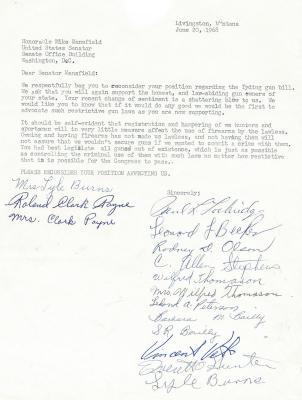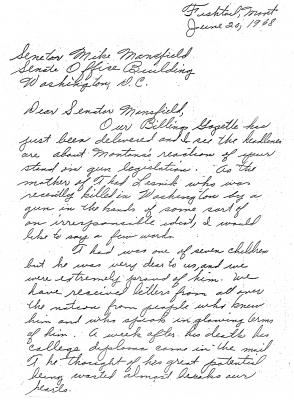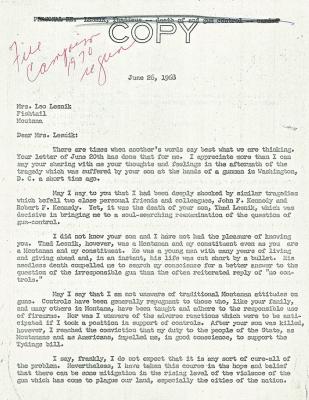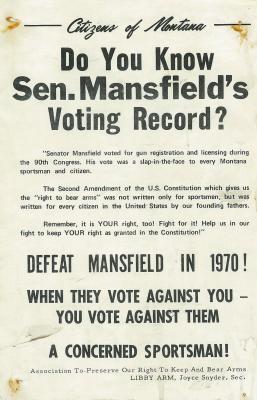Sticking to His Guns:
Mike Mansfield, the Gun Control Act of 1968 and the Election of 1970
By Nolan Franti, August 2012
Mike Mansfield was a Democratic Senator from Montana and served as Majority Leader of the United States Senate from 1961 to 1976. As a representative of a state known for its frontier mentality and strong hunting traditions, Mansfield may have seemed an unlikely candidate to support gun control legislation. Nevertheless, in 1968 Mansfield co-sponsored legislation that the Congress passed and President Lyndon Johnson signed into law as the Gun Control Act of 1968. Despite pressure from many of his constituents to reverse his stance on the legislation, Mansfield never wavered in his conviction that the law was a necessary and appropriate measure to combat gun crime. His perseverance resulted in the first significant national gun control legislation since the Great Depression.
Following the assassinations of Martin Luther King, Jr. on April 4, 1968, and Robert Kennedy, then a presidential candidate, on June 5, a national cry emerged for stricter controls on firearms.[1] Proponents of gun control hoped that new federal legislation restricting the sale, ownership, and mail ordering of guns would be effective in deterring would-be assassins and reducing what they perceived as a nationwide crime epidemic. In the wake of Senator Kennedy’s assassination, President Lyndon Johnson himself called for legislation that would require federal registration of all firearms.[2]
Mansfield initially opposed the President’s proposal, fearing support for a strong stance on gun control would prove politically unpopular in his home state.[3] On June 17, 1968, however, Mansfield announced his support for legislation Democratic Senator Joseph Tydings of Maryland had introduced that would require federal licensing and registration of firearms only if the states did not do so themselves. Mansfield justified his change of heart by citing not only the growing crime rate and the recent high-profile political assassinations of King and Kennedy, but also the murder of a young Marine cadet and Montana native, Thaddeus Lesnick, just a week earlier in Washington, D.C. [4]
With Mansfield’s support, the Tydings bill passed the Senate. As he had feared, Mansfield’s vote for individual firearms licensing and registration drew the ire of many of his constituents. Indeed, he told the Senate on July 3 that the negative volume of mail he had received on this issue had been the heaviest of his career.[5] Many of the letters registered extreme disapproval and even feelings of resentment or betrayal for Mansfield’s stand. For example, one constituent, writing on behalf of himself and 14 other petitioners from Livingston, Montana, stated: “Your recent change of sentiment [on gun control] has been a shattering blow to us…it should be self-evident that registration and hampering . . . hunters and sportsmen will in very little measure affect the use of firearms by the lawless.”[6] Those who opposed gun control at the time often employed the latter argument against the proposition that gun licensing and registration would be an effective deterrent against crime.
Other Montanans, however, were more sympathetic to Mansfield’s position. Understandably, one of the most passionate pleas for gun control Mansfield received came from Mrs. Leo Lesnick, mother of the murdered Montana native Thad Lesnick. In her letter of June 20, Mrs. Lesnick expressed her grief at losing her son and told Mansfield, “As to registering and licensing guns, I do not know the answer. But it does seem to me that if handguns in particular were licensed and stiff license fees charged then there might be fewer people who would have them. Surely the events of the past three months make some sort of action a necessity.”[7] In his June 26 response letter, Mansfield replied, “I say, frankly, that I do not expect that it [gun control] is any sort of cure-all of the problem. Nevertheless, I have taken this course in the hope and belief that there can be some mitigation in the rising level of the violence of the gun which has come to plague our land…If I ever had any doubts as to the course which I have chosen, your deeply moving letter has dispelled them.”[8]
Although the Tydings bill ultimately failed to pass the House, Mansfield subsequently supported legislation that became the Gun Control Act of 1968. Unlike the Tydings bill, the Act of 1968 did not require firearms licensing and registration, although it did require the licensing of individuals and businesses who sold firearms.[9] The bill also required gun purchasers to provide their identity and address when purchasing firearms and prohibited the sale of firearms to felons, fugitives, and persons “adjudicated as a mental defective.”[10]
Mansfield’s support for gun control would become the main campaign issue during his bid for re-election to the U.S. Senate. Mansfield’s Republican challenger, Harold “Bud” Wallace, alleged that Mansfield had violated the trust of Montanans by supporting gun licensing and registration.[11] A series of anti-Mansfield posters, petitions, and advertising in Montana newspapers also hit this theme hard during the election year. One advertisement, addressed to the “Citizens of Montana” and signed, “A Concerned Sportsman,” asked the following question:
Do You Know Sen. Mansfield’s Voting Record? Senator Mansfield voted for gun registration and licensing during the 90th Congress. His vote was a slap-in-the-face to every Montana sportsman and citizen...Help us in our fight to keep YOUR right as granted in the Constitution!
The advertisement ended with the words, “DEFEAT MANSFIELD IN 1970! WHEN THEY VOTE AGAINST YOU—YOU VOTE AGAINST THEM.”[12] Other criticisms included distorted charges alleging Mansfield favored federal licensing and registration of all firearms and even the confiscation of all privately-owned firearms. In fact, Mansfield did not favor confiscation and had supported a bill that required federal intervention only if states themselves failed to pass licensing and registration laws.[13]
Despite the uproar, Mansfield ran a fairly quiet and conventional campaign, although he did leave Washington to visit Montana over a dozen times in 1970 and was careful to respond to his constituents’ criticisms.[14] For example, in a campaign speech recorded on October 15, 1970, Mansfield addressed concerns that the Gun Control Act of 1968 would restrict the buying of firearms by saying, “Who is supposed to be prevented from buying guns? I’ll tell you who. Mental incompetents, felons, drug addicts, fugitives and others who are considered dangerous or potentially dangerous. Do you want those kinds of people to have guns? I don’t think you do, and I don’t either.”[15] The senator also responded during his campaign to the inaccurate charge that gun licensing and registration would be possible under the Act. “No such thing,” he said, adding: “The second amendment is still on the books. And it still stands, and it will stand. And as far as law-abiding citizens are concerned, they will not be touched by any motion made by Mike Mansfield or any law for which he votes.”[16]
Mansfield’s strategy was clearly to minimize the perceived threat of restricted personal freedoms while giving clear and persuasive reasons for his support of the Gun Control Act of 1968. He did so by convincing the majority of his constituents that the Gun Control Act of 1868 provided an effective tool against gun crime while respecting the right to ownership of guns by the responsible hobbyist or sportsman. Despite the best efforts of the gun lobby to unseat Mansfield, he won re-election to a fourth Senate term in 1970 by a comfortable margin.[17]
Questions about the essay can be sent to library.archives@umontana.edu.




